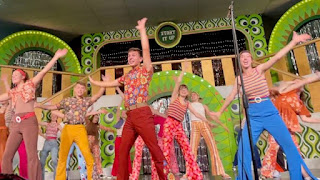"The need to attend to global citizenship education is essential" are the first words of a 2006 article from UNESCO. The article identifies that of the four pillars of education from an earlier UNESCO report, " 'learning to live together', remains the biggest challenge."
One of Minnesota 4-H’s goals is to help youth develop global citizenship skills. A quick Google search identifies many other organizations - from Fulbright to National Geographic - that have learning opportunities with the same goal. How can youth workers across organizations help youth build these skills?
Emerging research shows that youth’s personal sparks help direct them to growth, contribution, and connection. Youth workers who can harness the skills, interests, and special qualities of youth and connect them to desired learning outcomes see increased odds of success.
My personal spark for theater arts is one I enjoy sharing with youth; it’s also one that can easily help youth expand global citizenship skills. A 2007 study of a high school theater program reported about one participant: "she had her 'eyes opened' to the wide range of experiences people have gone through and how these shaped their emotions." A 2012 study asked adults who had participated in high school theater and speech activities about the impact of those activities on their lives. Some of the impacts respondents reported were "gained global, social, cultural awareness," "expanded worldview (political, social, religious)," and "learned to accept differences."
Designing theater experiences that help youth grow global citizenship skills takes intention and quality. As one respondent in the 2012 study said of her school’s theatrical selections “they were often very safe and uncontroversial and didn’t really push any criticism of the status quo.” Use these tips to help create an intentionally challenging program:
- Work with diverse source materials. Youth can’t expand their worldview if they aren’t exposed to other viewpoints. Engage materials written by and about characters who differ from the youth in your program. Race, ethnicity, national origin, religion, gender, sexual orientation, socio-economic status, and more can all provide new viewpoints to youth.
- Develop a supportive program culture. Youth need a safe and supportive environment in order to interact and engage with material. Creating a program culture that allows youth of all identities and viewpoints to feel safe, valued, and heard is a critical component of our work.
- Engage dramaturgy. Responses in the 2012 study indicated that the learning in theater programs was "better with supplemental research." Exploring other primary and secondary resources will help youth understand the viewpoints and issues presented in their theater works.
Helping youth expand their global citizenship skills is a challenging and worthwhile goal. If you already use theater as a tool, what tips would you add to this list?
-- Sarah Odendahl, Extension educator
You are welcome to comment on this blog post. We encourage civil discourse, including spirited disagreement. We will delete comments that contain profanity, pornography or hate speech--any remarks that attack or demean people because of their sex, race, ethnic group, etc.--as well as spam.

Comments
Post a Comment